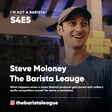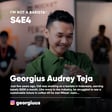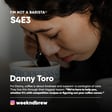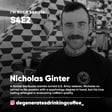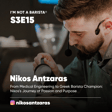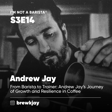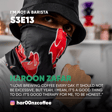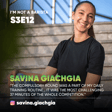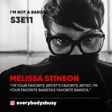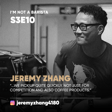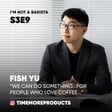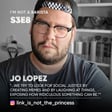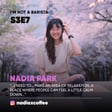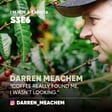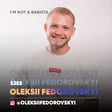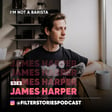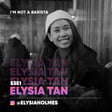Introduction and Podcast Aim
00:00:04
Speaker
Welcome to the I'm Not A Barista podcast. We're here to talk about all things coffee from industry careers, brewing tips, community support and more. We hope their stories inspire you because humanity runs on coffee and together we can empower all the people behind every cup.
00:00:27
Speaker
Hello, everyone. Welcome back to I'm Not a Burry's Top Podcast.
Guest Introduction: Damien O'Brien
00:00:30
Speaker
Today, we're happy to have Damien O'Brien from the Coffee Foundation with us. Damien, thank you so much for joining the show. Your work is truly inspiring. So let's get to know you. Damien, um tell us more about yourself, your coffee journey, and how you started everything.
00:00:48
Speaker
Absolutely. My name is Damian O'Brien and firstly, declaration to all your listeners with my Australian
Coffee Foundation's Mission
00:00:54
Speaker
accent. So if you need the subtitles to come up, I'm from Sydney, born in Sydney, Australia, and I'm the founder of the mental health association located here in Lausanne, Switzerland. That's in the French speaking parts of Switzerland. Just a quick one for you listeners. We are four national languages in this country and English is not one of them. So.
00:01:15
Speaker
I'm located in the French, speaking about half an hour from Geneva. And Coffee Foundation is our brand campaign that ah we trademarked ah to basically try and get a country that doesn't speak about mental health to start talking. So you mentioned that ah mental health is not a hot topic there. I mean, in Switzerland or in Australia?
00:01:38
Speaker
Oh, Switzerland, between you and me, Mickey, I'll let you a little secret. The podcast ah will help us break down a little bit of stigma and taboo because talking about mental health here is one of Switzerland's biggest taboos. It's a cultural thing that's not really embraced ah because it's very difficult for many people. Many people find it very uncomfortable to speak about mental health and it's kind of perceived a little bit as a weakness.
00:02:06
Speaker
Definitely. It's not easy. um So tell us more about how you started Coffee Foundation and how did it all begin?
Damien's Journey and Specialty Coffee
00:02:13
Speaker
All born in Sydney, Australia. So growing up around ah specialty coffee, ah kind of, you know, us Australians, we think we're kind of the the mecca of coffee, which we're not. But Australia's boomed in coffee in the last 20 years. But So when I came to Switzerland 19 years ago, where I married my Swiss, my so but beautiful Swiss wife, coffee, specialty coffee was kind of just starting off here as well. So I really thought at that stage when I came over here that I noticed that nothing brings people together better than coffee.
00:02:49
Speaker
um so I've decided that ah over the last many years, I had to find a way that I could integrate my passion for coffee, my passion for brand building, and of course, my championing of mental health. ah How could I bring it all together? and so That's really how the catalyst of the association started.
00:03:11
Speaker
And then i realize that if there was gonna be a coffee foundation what would it do if there was one coffee foundation a charitable body for coffee what would it do. And the light went on in my head and i realize will it would try to solve one of our biggest social health issues and that's about mental health because.
Mental Health and Coffee as a Conversation Starter
00:03:31
Speaker
ah When something is it to do or something's very difficult to speak to about because of shame or stigma or judgment.
00:03:39
Speaker
How do you reverse that culturally? Well, you take the darkness and you shine light on it. And that's where the kind of the idea of coffee foundation come about. I really had to also, and I had to build an idea on the fact that I'm not an expert about mental health. I'm the complete other spectrum of the expert. I'm the i'm the person like many of your listeners and the millions of people around the world that suffer from mental health issues. And mine goes a little bit darker because I've got that
00:04:13
Speaker
diagnosis of mental illness which is bipolar disorder which about six years ago i was diagnosed as. bipolar And my mother unfortunately died of suicide um and my brother will also died of addiction and they struggled with their mental health. So for many years, nearly 35 years, I was kind of in self-denial that those same dark clouds that used to follow my mother would start to follow me and and they did.
00:04:45
Speaker
so I had to take kind of have a let's say revolution or an awakening in my life of how do i take all of the darkness sad tears and pain and do something great with it. And the answers are usually in life right in front of you mickey as you know but when they answer so close and so painful.
00:05:06
Speaker
everyone was saying, damie you have to do something mental health, you have to do something in awareness, you can do something, you yeah have some talents. But after that diagnosis, Mickey, I ah kind of was destroyed internally because I thought, well, how does someone with a mental illness have a voice to speak about something so sensitive because only experts and then and then people said to me, I mean, you don't need to be an expert. So it's very personal because, of course, I've got the um I've got the sometimes the way to making sure that i do something is authentic as i can and meaningful to everybody because everyone relates to the topic in their own way.
00:05:47
Speaker
If you're really sorry that you have to go through all of that and it's just, I can't imagine that. um But what you're doing right now is very, very inspiring. Desi said, well, we want to hear, we want to know, you know, that's why your your story matters. So you spend a lot of hours and energy, your emotions on building this safe net for everybody.
00:06:13
Speaker
um Yeah, it's the the the spectrum is so complicated. there's you know we and Depression, addiction, and I'm no expert. i Again, I have my monkey, which is why I call it my monkey. It's my bipolar disorder. It's like a double-edged sword. it It brings me so many great ideas.
00:06:33
Speaker
But it's something that I have to manage.
Personal Struggles and Societal Judgment on Mental Health
00:06:35
Speaker
And of course, i yeah through through through support from psychiatrists and for the last six years, I've been able to rebuild my life. But there was one thing, Mickey, that was really weighing more, sometimes more than the diagnosis. It was the shame and the judgment in society.
00:06:53
Speaker
that when you are actually diagnosed with a mental illness and you have a serious condition, I was hiding this from my family and from everyone in my life because I wasn't sure how they were going to perceive it and and and sometimes society kind of scares us. I was pretty scared of the fact that You know, someone that's classified as let's say crazy is a danger to everyone. and And in my case, I'm not a danger to anyone except myself, um, because people with bipolar are also a very much higher risk of a suicide. And that's something that I had to come to terms to with actually when the reality is my mother, you know, those dark clouds, uh, we're, we're going to be able to be solved that, uh, would help my mother in time.
00:07:41
Speaker
I really appreciate it you opening up about this past experience. um It must take a lot of courage to share such personal stories. And I know it's not easy. I thank you for doing that and trusting us with the past of your journey.
00:07:58
Speaker
um I'm also curious, how does your channel those pain and turn turn it into something positive? What inspire you to choose coffee as the medium to create coffee foundation?
00:08:12
Speaker
I sat there Mickey for many years looking and I've always been passionate about branding and advertisement and design and creativity and you know great brands can change culture. Back in Sydney now I you know i used to grow up in suburbs in neighborhoods that you know when you're a kid no one would want to go to those areas you know.
00:08:33
Speaker
and the and and Sometimes you have this evolution in society, in culture, where things that were once not safe are now safe or even cool. and so How do you make something change culturally that's unacceptable? and I think mental health discussions have been communicated over the many years the same way with darkness, violin, ah in ah in a communication style that's always really under about tears and pain. And I wanted to do something completely opposite. I want to shine as much pink love, brightness onto the darkness.
00:09:13
Speaker
And that sometimes can change something from a perception of being sad, which it is in many aspects, but then something safe for even me and you to talk about or to talk about young with young people or with family. And, and as you know, over the last 20, 30 years, things that we never would speak about 20 years ago, we spoke, ah we speak about them every day. They're on our LinkedIn profile.
00:09:37
Speaker
um and I feel that mental health is probably the biggest taboo still to be broken. and How do we break that? We make it easy to talk about. and Nothing brings people together and creates a safe space than coffee. It's it's a ritual that we do when we walk into our fable coffee shop with a barista. Sometimes our barista knows more about us than our actual closest family member.
00:10:01
Speaker
And in Australia, I saw this ritual as it was growing up. I was like, it sets the safe space for a conversation. And mental health, a lot of it is related to the fact that people don't reach out so for support because they're overwhelmed with judgment and stigma and shame that delays the fact that they can reach out for support. And I'll just tell you from a personal fact,
00:10:28
Speaker
Yes, I have my medical support. That's a big part of what supports me, but 85% Mickey is the people around me, my friends, my family, and my, so and my, the closest people it by removing that shame and judgment, they have been able to empower themselves under me to say, okay, Damien, you do have your down days. You do struggle that we're here for you. They're not there to solve my problems, but they're there for me.
00:10:58
Speaker
And with the crisis that we're having around the world, especially with youth mental health, as adults, we don't even talk about mental health. We find it uncomfortable. So how are we going to so open that safe space for young people if we don't do it? I have two young children, 15 years of age, and I was lying to my own kids for years about my mental deep diagnosis condition because I thought I can't actually, it's safer not to tell them safer for who I was lying to my children because I feel that I was going to somehow burden them with their issues. And then when I finally realized to share with my daughter, your dad struggles, she turned to me and she said, dad, that's amazing. I'm so proud that you told me that I can't believe that you would have been hiding this from me for years.
00:11:51
Speaker
And for me, coffee is just a Trojan horse. it just sits We can use it as the Trojan horse to break down through the wall and break the silence. And coffee, even if you just take five for five minutes to check in and with somebody, not to solve their problems. We've got two ears and one mouth. Listening is the greatest strength that we've got.
00:12:13
Speaker
You just, but people, you would be surprised, Mickey, so many people around us have got a mask of society, which tells us that we've got to be perfect. We've got to have everything done and we've got to have our filters perfect. And if we remove that mask, we realize like we are now, Mickey, we've got so much more in common because we embrace that superpower, which is vulnerability.
00:12:38
Speaker
And when you're vulnerable, which society doesn't tell us to be vulnerable, you know, I'm from a tough neighborhood, vulnerability, that was never my part of my program in my hard drive. Vulnerability was the only way I could fight my monkey, which is bipolar because my monkey hates vulnerability. It wants to, it wants to take me on a road of destruction where I said, no, no, no, we're not going to do that. I'm going to share to my closest people, my vulnerabilities, and we're going to fight back.
00:13:07
Speaker
And that's kind of how coffee I find is the first step. it's It's the, you know, there is no magic fix to all of these issues. But one thing I know for sure is that vulnerability is the superpower that can bring people together and shared coffee. There is nothing in the world that sets the safe place for people to share their most intimate um struggles together or, you know,
00:13:34
Speaker
just to share that moment. You know, people barely meet these days where it was so, we think we're connected, but we're sometimes more disconnected than we've ever been. You know, I totally agree. This isn't something that we usually dive in on our podcast, but I can really relate. As you remember, a few years back, we have this, um, a fun Movember LUTR challenge just to bring a smile to people's faces and just to highlight the importance of mental health in a coffee industry.
00:14:05
Speaker
And ever since I stopped in the coffee industry, I've often heard these kind of stories like how someone else's parents discouraged them from pursuing coffee career because it was often seen as a bad career or how baristas often, you know, stereotypes in movies are disliked and educated, have low value. So it's such a damaging image and it really hurts many people. And that actually really resonated with me. I want to dive in a little bit deeper into the coffee side of your foundation. I understand that you sell coffee beans. Is that your main way to raise funds or you do rely on other donors or methods? Could you please tell us more about how it works?
Building a Social Enterprise
00:14:55
Speaker
That's a great question, Nicky. Those little details that drive me absolutely up the wall.
00:15:00
Speaker
So here i am passionate about coffee got so many things i'm juggling and i realized okay. You can still have a beautiful colors brand website but your product has to be and i believe like you i think mickey your product you always want your product to be the best the best it possible can you wanna meet customers expectations.
00:15:22
Speaker
And I will be honest with your listeners, I didn't feel that I could do that myself. I don't feel I had the experience to create the roastery straight off the bat to deliver to customers something that would be below their expectations. So I thought to myself, Switzerland hass had an explosion in the last 15 years of specialty coffee, small roastery setting up here and there.
00:15:49
Speaker
and i thought And I looked around and I thought, okay, are they roasting coffee every day of the week? And then a light went on. I said, a lot of these great little baristas or roasters, they make a huge investment and they have a machine that sits there and maybe five days vacant per the week. you know They roast two days a week. So they're making this huge investment and their machinery is basically sitting dormant.
00:16:15
Speaker
So then I said, okay, I think I might be able to find another a roaster that's actually established. It's got that premium product already there. So I sent an email to about 15 roasteries around Switzerland. And can you imagine, Mickey, as I explained the project to them two years ago, I said, I want to make a social enterprise brand. And they're like, but what's the business? I said, no, no, it's the hashtags call us crazy. There is no commercial sense here. This is another, this makes any sense.
00:16:45
Speaker
I got one email reply and i was like to you know completely depleted i was like oh no it's not everyone thinks i'm completely crazy and that's the hashtag so it's okay you can think that cuz i was thinking that i still do. I got this beautiful email from a miracle christopher salsa.
00:17:04
Speaker
And it said, oh yeah, great, come up and see me. And at that stage, I didn't take it further. I didn't even research who it was. I was just so depleted. And I said to my wife, okay, there's a guy in the Swiss Alps. He's at 1,500 meters in a small town called Lazan. And I drove up to the mountains and didn't even have a look at who it was.
00:17:25
Speaker
and I walk into this amazing little roastery in the Swiss Alps underneath a traditional post office looking at across the ah valley. and I walk in and this amazing smile from this individual, Chris smiles at me and he goes, oh hey, come in, sit down. and I just gave him like you, 35 minutes of giving him a vision, two years, no slides, no color. I said, I've got this vision for a crazy coffee called Coffee Foundation.
00:17:53
Speaker
We're going to do something for mental health and 35 minutes, he's Swiss German, very precise. He didn't say a word and I'm thinking, oh no, this guy thinks I'm a total lunatic. How am I going to get, I wanted the ground to open and just swallow me. And I was feeling sick in my stomach. I was going to vomit and I so i said, could I use your bathroom?
00:18:14
Speaker
And he said, yeah yeah, it's through my office, go through there. So I'm going into the office thinking I'm going to just die and and and spew vomit. And I look up on the wall and he's got an Olympic medal on the wall from Sydney 2000. And it's one of those moment makes like the light, the light, you know, when the the heavens open, oh I looked at, I'm from Sydney, Australia. And I come out of the bathroom with my stomach clear. And I said to Chris, I said,
00:18:44
Speaker
Chris, you didn't tell me you're an Olympian ah and such a Swiss beautiful person with no big noting. He says, Oh yeah, I like Sydney. I had a, I had a good time there. And I'm like, you had a bit more than a good time there. You won a bronze medal at the Sydney 2000 Olympic games. It's not bad. He goes, Oh yeah, but I've also won five world championships in, uh, in mountain biking. And at that moment in my mind, I said, this is the guy.
00:19:11
Speaker
And Chris said to me in a Swiss German accent, I love it. I think it's great. If you can do it, I'm behind you. He said, if you can do what you've just pro proposed and you've got the courage to do that, you're going to have the best coffee in coffee foundation to start off with.
00:19:29
Speaker
So basically my coffee supply which is called Horizon Coffee, he takes care of all of the coffees for me and basically individually goes to his farmers in South America and we he's decided that he's willing to substitute his commercial profit that makes sure that Coffee Foundation has the organic kind of model as a social enterprise.
00:19:57
Speaker
And that's where we're at. So I've got an Olympic champion that you know has this highest of standards of roastery quality to make sure that everything that comes out of Coffee Foundation um meets customers' expectations for flavor, taste, and I can't be i cannot be more happy than that. What a story, Damien, really. That just doesn't happen every day.
00:20:21
Speaker
I think maybe it is meant to be like that. About your coffee, about the beans, when your customer receives a parcel, like what are in the box except coffee? I don't call them my customers. I call them my fighters because our brand is fight with us or call us crazy. so i i'm not I'm not a commercial aspect. my why The people that purchase from us obviously have a a connection with the cause. and I make sure that my fighters receive everything personalized down to the box. When we open the box, for example, we have our mission statement, which is
00:21:02
Speaker
ah Our dream that mental health is treated with the same care and compassion as physical health. We then include a brochure, which is our take five, which is basically how to start talking. I know it sounds trivial. Talking. How do we actively listen? Kindness. Encourage people to seek help.
00:21:23
Speaker
And then we also give people resources in the packaging of how to reach out for support if they are struggling or if they know somebody in their life that could need support.
00:21:34
Speaker
Mickey, it's very difficult even when you know someone that you care about and you see that they're struggling. They could be through addiction, depression. You just said about baristas, running a small business, the amount of stress that that brings you on you to create a business. Like you personally, Mickey, you're having some problems with some organizations legally.
00:21:54
Speaker
This can really and put a huge pressure on you. And coffee foundation as simple is simple. It's just leaning on the people around you to say, you know what? I haven't, so I can't solve all your problems, but you don't have to go through that alone. You know, too, Mickey, when you share some of your struggles, it takes off a bit of a burden that you're not going through everything by yourself. You know?
00:22:16
Speaker
so i dont That's where we stay in. We stay in the awareness process. and By being a commercial enterprise, people that support us, we then donate our funds that we can up to 5,000 francs in our first round to three charities which are on the ground in suicide prevention for young people.
00:22:36
Speaker
so That's the first model. Of course, my big dreams is to be bigger than that. And I dreamed a coffee foundation in the next five years is close to one of the biggest and best brands in Switzerland. I think Nespresso and George Clooney got other ideas, but you know that Mickey, you dream big and you swing, you know, you shoot for the stars. And if you miss, ah you shoot for the moon. And if you miss, you might land on a star. So, you know, I don't have all the answers, but I tried to do the best I can.
00:23:03
Speaker
Thanks for sharing all of that. Now, let's say if one of our friends is struggling with mental issues, how can they get in touch with you? And what kind of support does your foundation offer?
Support and Purpose through Coffee
00:23:16
Speaker
Anyone, anytime can reach out to me on social media. I i want to recalibrate that I'm not an expert. I'm not a psychiatrist. I'm not a psychologist. I can't solve your all your issues. But if anyone wants to reach out to me just to have a chat,
00:23:33
Speaker
and That can stay always stay between the two of us. i love to i got I get hundreds of messages from young people that just say, the brand makes me feel good. you know Sometimes that's enough, Mickey. The brand makes me feel good. It brings a smile to my face. It's good to have a brand or an organization that goes a little bit deeper than trying to leverage on everything, a new idea. um but To make things a bit clearer,
00:23:59
Speaker
For the people that might be struggling, the best piece of advice I can say to them is, you're not weak to seek support. This is a reap this is a such societal program that was in-programmed in us that we have to mask our problems and tell everyone from social media to every day that we've got everything perfect.
00:24:22
Speaker
And I'm not weak, definitely wasn't weak. It took me so many years to actually reach out and get diagnosed. And without that diagnose, Mickey, I wouldn't be here today. I hit rock bottom and I was 25 days in hospital with my stomach hemorrhaging ah from my Charlie Sheen moment, as we would say, you know, I was on a destruction path to oblivion.
00:24:47
Speaker
And usually small problems start small and then they snowball into huge problems so my advice would be if anyone is listening that is got these sometimes that head noise that. Life is too difficult or they're in the grip of some type of addiction you know alcohol drugs etc.
00:25:08
Speaker
Get your ass to some help i went to a i walked in there with the alcohol anonymous and of course i thought oh my god what am i doing in here i mean i'm not an alcoholic but i was i was an alcoholic and i was mentally ill.
00:25:23
Speaker
And the light went on when I sat down with my psychiatrist, and I'll tell you a quick, funny one. Damien, let's have a coffee. My psychiatrist, after 20 days in hospital, sat me down and said this was where she had the the huge blow. Damien, you're diagnosed mentally ill.
00:25:41
Speaker
and When you get a diagnosis like that, it hits you like a a freight train. you know like I'm going to walk out of here a mental health facility and I'm diagnosed with a mental illness. No one is going to ever want to be around me, near me. My dreams are shot.
00:25:57
Speaker
And she reprogrammed me in 2 days to say, Damien, many people don't even get here. You are not weak, you are strong. And that's my advice to everybody is that you have to get past this program that you are weak to speak. You can find support in your local so society or your local community, and you will find someone that will actually share or we could help you with the struggles that you're going through.
00:26:25
Speaker
So that's my best advice, Mickey, is that you're never as alone as you think you are. and There's resources around the world, but it takes that first step and that first step. I know it's a cliche. It is the hardest. And talking about it as we are right now is between you and Mickey is sometimes it's a bit awkward. We've got those little cobwebs on us because we're getting vulnerable. Oh, this is we're going into uncharted area that we're talking about it. And you know, I've had so many hundreds of contacts from people that says, they've said to me, oh yeah, actually I know somebody else or my grandmother or someone I really care about. And what hurts me the most, Mickey, is when you hear about people who are so concerned about people that they love,
00:27:10
Speaker
they you know their their village I call it their village. The people around you, they say, I'm not um' really concerned, but ah don't want to I don't want to impede. I don't want to be rude. I don't want to upset the person. And I used to be the same, Mickey. I was like, you know, people would never say anything. And then I look back now after so many years and I realized those great people that were around me that are still around me today,
00:27:37
Speaker
They've accepted me for, you know, they said, Damien, we knew you were crazy, but it's great to see that you you did something and we the last thing we want to do is see something terrible happen to you. And I added every all i had it all mixed around, Mickey the wrong way. I was like, oh, no, no, they're going to disown me and I'll be isolated, which I was. A lot of it is myself.
00:27:57
Speaker
And people are like, yeah, Damien, we always knew you, there was something special about you and it's great that you can be the person that you are. And by removing that judgment and that self stigma and that self shame and realize, go okay, I've got some problems, but I'm going to tackle it. I'm going to, you know, I'm going to get sober six years sober. I'm going to not, you know, self-sabotage myself and drive myself off a cliff.
00:28:22
Speaker
I'm actually, you know, embrace this craziness and say to my little monkey, Hey, can we do something good with that? And you know, that little voice and said to me and inside me said, yeah, coffee foundation. Let's try that.
00:28:34
Speaker
Well, Damien, what incredible chat, really. Honestly, I think you're feeling right on Joe Rogan's show no with all the you know stories you shared today with us. You are my first, you're my first lover. You're like my Lionel Richie, you know? Mickey, I couldn't appreciate, I have to give gratitude and that's something I had to learn too in my life, Mickey. I used to be at When know I'm in the depth of addiction, you become so selfish and you don't realize the greatest gifts that you have are right in front of you, which is gratitude, kindness, and giving back to people. you know None of what I do makes any financial sense. i've spent you know spent but It's been the best experience of my life. is
00:29:17
Speaker
I was 45 years sitting in front of YouTube, listening to all the entrepreneurs and the answer was always their purpose. Finding your purpose in life, you know, not your riches, your purpose. And I was always chasing the wrong dream. You remember that movie with blow from Johnny Depp, I had the wrong dream, you know, and once I found purpose.
00:29:40
Speaker
Um, and and, and that's what I'm doing. I decided to not let the darkness, uh, destroy me. And when you, you know, there's a famous quote from, um, I think it's called, what is it? There's a crack in everything and that's how the light gets in.
00:29:57
Speaker
And it's again about the reprogramming that we've all got our limits to where we're breakable, you know? And Mickey, I thought I was unbreakable. I've been through so many tragedies and difficulties and I used to feed that beast by those saying, yeah, I can get through anything, you know? And no, no, no. And I think even the strongest people in the United States, you know, military people will, will attest to that. I'm not comparing myself to a soldier, that's for sure. but um you know, everyone has a break breaking point, you know, and we programmed to feel that we can just power on through everything and we can't.
00:30:37
Speaker
And, uh, we, we don't have enough resources. We don't have enough psychiatrists and and psychologists around the world to solve everyone's issues. Sometimes the greatest support are right in front of us. And like us, we're talking now, Mickey, I'm, I'm already feeling better, Mickey. You, you're making me feel better by just sharing this conversation with you. You are a very good listener. You're a coffee foundation ambassador, you know, straight off the bat. We don't pay influences. We just pay people with good values, you know, and listening.
00:31:05
Speaker
Is that it's a super power it's an I've still got to work on a bit more of a chatterbox but if you get it how good you feel when you just can share with people. ah How you really feel and you take away that shame and that judgment and stigma that it weighs you down.
00:31:24
Speaker
I really hope that I can be a better listener. My vibe hopes that too. So I know what many people are still trying to figure it out their life purpose. I mean, it's important for all of us to to know the main meaning of living a life. And we'll learn our lesson through both good and bad experiences, right? So often the toughest moments teach us the most valuable lessons. Do you have any advice or tips on how people can discover their life purpose in a more positive way. I hope so. but hope so and We'd be terrible to say, isn't it wouldn't it be terrible to say to people you have to go through ah darkness to find the light? but
00:32:11
Speaker
I think you i think nikki you know when most entrepreneurs or let's say also baristas, coffee shop owners, they sometimes their first business fails. you know Something that you're so passionate about and then you come to the realization that yeah it wasn't a success.
00:32:26
Speaker
And then but again society we measure success wrong in the world in the in life that way we always measure success by can you know by materialistic aspects in a. Coffee foundation for example makes no money it's not i never you know and i never made it for money i made it on creativity with my designer who's my secret weapon i can't give you him his days he's like james bond.
00:32:51
Speaker
i have so I have some people in the background that are so talented and when I contacted them with this idea, they said, no, no, if this is what you say it is, I'll help you. But if this has got something to do with commercial or trying to make money, I'm not interested. And there's so many great people out there that have got these human values, you know, and they get caught up in these wrong commercial aspects because of course we need to make money. We need to survive and pay the bills, you know.
00:33:21
Speaker
But true meaning in brands is what gives you meaning. What does a brand mean to you? you know And Coffee Deaf Foundation has been such a challenge because that's all I started with. I wanted it to be a brand that means to something to people that doesn't solve their problems, but makes them smile. you know And that our values of what we're building here are on authentic DNA. My values are based on real disruption, village.
00:33:50
Speaker
Village for me is what we're about. Your family, friends, community. community it's ah it's a It's a hashtag for many a lot of people. Community. Community is helping your community and not always expecting to get something back. You know what I mean?
00:34:05
Speaker
and um And of of course, vulnerability is the last you know it's the last foundation value of the organization because I went my whole life not knowing what vulnerability was about. I pushed it away and I realised my mental illness was going to kill me. It was going to destroy me. My greatest asset was my was my little bipolar when i was a young person telling me that everything is possible you know that's part of bipolar it's this grandeur that you can achieve anything. I needed growing into this from a small monkey into this huge gorilla that was gonna just absolutely destroy me my family and everything i've ever stood for.
00:34:49
Speaker
But then one day, again, I got this super powerful vulnerability and I told the monkey, no, no, no, I've accepted you. I've accepted me and turn the light on. And once you embrace vulnerability that you're not perfect and you're never going to be, you realize, wow, there's so many people around you that are so ah going through maybe the similar thing. I guess everybody has the monkey.
00:35:13
Speaker
Everyone has a monkey. That's correct, Marty. And some of them are pretty, some of them are friendly. And then some of them get out of control and they start taking over the controls of the factory. A little a bit like Willy Wonka, my monkey was. He was like the lumpa lumpa. And then he took over the chocolate factory and, uh, and, uh, yeah, it wasn't going so good, you know? But, um, yeah, that's it. Those head noises that we have, you know, you have those doubts, to anxiety, how many people stuff them from.
00:35:43
Speaker
I, for some reason in my life, I went 30 years in and I never kind of seemed to have anxiety and I used to. No disrespect, love to people. What's these people talking about anxiety? I was a confident person. And then one day the spider webs came on me, you know, and I, now my heart goes out to people that suffer with anxiety, you know, but anxiety also wants you to do the opposite to what the solution sometimes, but anxiety wants you to retreat.
00:36:11
Speaker
and and hide in the cave and I wanted to do that. I wanted to lock myself away from the world. But no, you've got to do the opposite to what that monkey was. You've got to take him outside, get him to the gym, get him moving, getting back around people, speaking again. And then you realize, oh, okay, the monkey wants to lock me away, but no, no, we're going to get out. We're going to keep moving. And um yeah, that they were, they're kind of the key pillars of what coffee foundation is about.
00:36:41
Speaker
I'm really curious if you don't want to share more information about names. I have to say the Coffee Foundation branding and design on your website and your social media are top-notch. I ah really want to know more about the team behind it and what a typical day looks like for you as a as the founder.
Daily Routine and Managing Stress
00:37:02
Speaker
My daily life is an absolute rollercoaster. So we start in the morning, usually down. I wake up in the morning terrified with anxiety to say, Oh my God, how am I going to get through today? And, uh, that usually starts the day. And then I roll over in my bed and I see the most important person in my life, which is my wife and my, she's been my rock for 20 years.
00:37:31
Speaker
a lot of what was spoken about mickey is about me me me and my wife is like a lot of the carers out there that look after people that are struggling in life you know without my wife ah there would be no damien there would be no coffee foundation.
00:37:48
Speaker
So my day starts with gratitude ah towards my wife. And then each day I get up and I come with the ideology customer number one. I try to make sure every customer's delivery is treated like the first one, that they're an ambassador and they're a fighter. So I do spend a little bit too much time emphasizing on every delivery because I'm a perfectionist. I'd like everything to be perfect.
00:38:15
Speaker
And then of course I tried to plan for the future just the other day Geneva has got the world expo of coffee in two thousand and twenty five. And they said to me damey would you like to be in the roasters village or would you like to have a stand or an exhibition.
00:38:32
Speaker
And of course my monkey says let's get a stand let's have a huge exhibition you know twenty thousand feet and let's have high screens and you know popcorn machines and all sorts of things and then i have to say to the monkey no we can't do that much we have to scale it back.
00:38:49
Speaker
So I'm already planning for Geneva, which is going to have, of course, the Specialty Coffee Association's World Expo here. And I'm already trying to think out six six months, 12 months in advance, Mickey, and that for my brain is quite difficult. um So that's the plan.
00:39:06
Speaker
And um I'm working on some other projects. Of course, they've got some amazing big corporations in Switzerland that are contacting me because they see that I'm trying to do something related to community. And that, again, terrifies me with stress and anxiety because I i want everything to be perfect. But I don't have all the answers. Mickey, I'm just doing the best as I can day by day.
00:39:31
Speaker
It's really stressful to to manage multiple projects at once, and I totally relate. With limited resources, you can only do so much, and keeping the stress and the control is not an easy task. So when you feel like you cannot do it at all, who was there, how motivated you along the way?
00:39:52
Speaker
You see the beauty and when people go to coffeefoundation dot.com or .ch, I have a, yeah let's say it's, I call it when craziness meets genius. I'm the craziness and then I had to find the genius. And I found the most beautiful human being in in Milan.
00:40:16
Speaker
He he what he wants for the world's biggest brands i want name them are but they're on television you drink them you eat them. And i said to him two years ago it took me weeks to get in contact with him i got laughed at with design is in zurich new york london trying to find someone that could help me paint this picture.
00:40:38
Speaker
And this a beautiful Italian man took my phone call with his ah his man bun and his little cell his little glasses. he Finally after weeks, he took my call and his Italian accent. He said, I don't know what you're trying to explain to me. What is this? I said, I have a vision for for making a social enterprise that can tackle one of the world's biggest issues.
00:40:59
Speaker
And he says, I need 24 hours a day. I so swear I work for the biggest organization in the world. What you're saying makes no sense. I said, that's the whole idea. And, uh, he rang me back 24 hours later and he said, okay, I will help you to create a beautiful brand, but it has to be based on something for community. And I say, exactly. And, um, with, with this secret weapon, my James Bond in Milan. Hello.
00:41:28
Speaker
ah we be we were able to create Coffee Foundation. He'll be listening to this and I just want to say that ah at from the start of this project, I was never going to step over the top of people, like you said, my team who have helped me. and Without him, there would be no Coffee Foundation. and I love you. If you're listening, I love you.
00:41:50
Speaker
It's really awesome that you manage to find these people who make the coffee foundation possible. That's an incredible job. I think what you said really hates home. When we drop off our masks, we are more connected than we realize. And your story today today has been really eye-opening and it's...
00:42:12
Speaker
Reminded me that it's okay to feel warm sometimes. And thank you for sharing so honestly, and it it truly makes a difference. And I really do hope this episode is going to be helpful one for the audience who are listening to this.
00:42:27
Speaker
That's Mickey, and again, there is no quick fix. there's no like When you said, I wish I had the magic pill to take people's pain and suffering away, you know and there is not. the the great What we've discovered just the two of us now is that vulnerability, your monkey, my monkey, and that we took those little masks away and we've broken some we've broken some barriers. you know yes and ah you know If we ever talk again, we can pick up exactly where our monkeys have dropped us off here. you know We've got something in common. We're absolutely not as different as we all think we are. To your all your audience out there, I keep the peace. Kindness never hurts. and I'll tell you a little secret, Mickey. I'm not in the coffee business. I'm in the people business.
00:43:15
Speaker
Thanks for tuning in to this I'm Not A Barista episode. Subscribe to this podcast and follow us on Instagram at I Am Not A Barista for more empowering vibes and true coffee stories that connect you with coffee lovers around the world.

